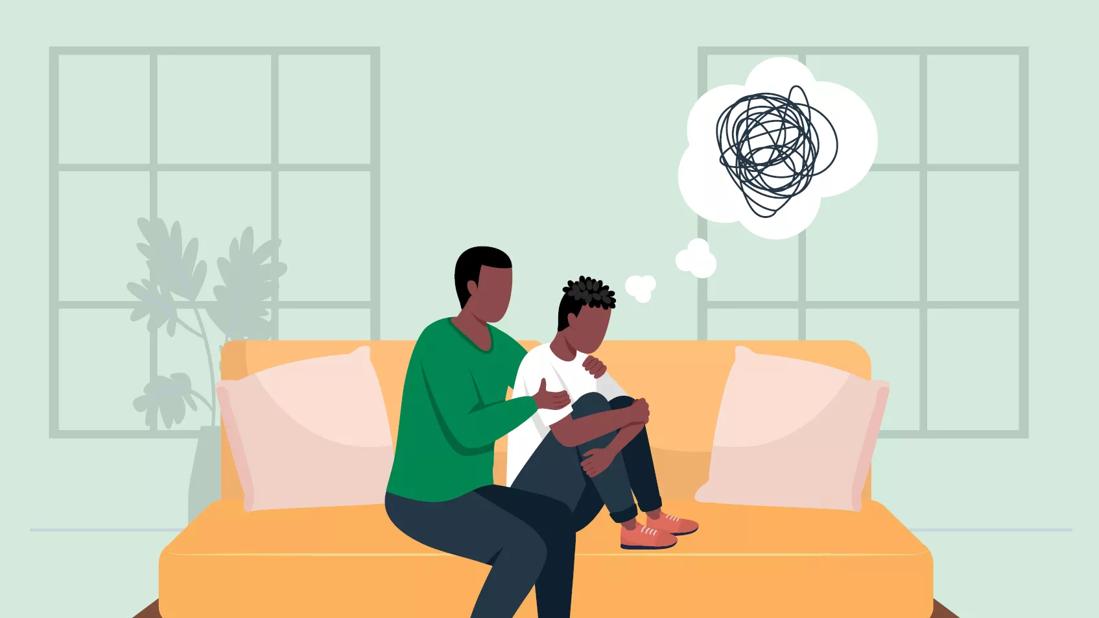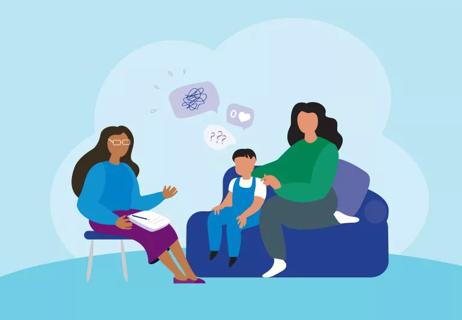Be honest, supportive and listen to what they have to say

There’s no escaping it: Horrors live in many of today’s headlines. As adults, it can be difficult to cope with the daily news feed. But explaining these events to children brings a whole different challenge.
Advertisement
Cleveland Clinic is a non-profit academic medical center. Advertising on our site helps support our mission. We do not endorse non-Cleveland Clinic products or services. Policy
Because kids know when something is happening. They’re exposed to anxiety-inducing news, whether at home or at school, from their early years into their teens.
So, what can you do to help your child understand and process unsettling news? Taking an active approach and discussing difficult events in age-appropriate ways can help your child feel safer and more secure, says pediatric psychologist Kate Eshleman, PsyD.
Here’s how to have that open and honest conversation about what disturbing news they might be hearing and seeing.
Before talking to your child about what happened, be sure that both of you are prepared for the conversation. “It’s important to provide the opportunity for your child to talk about tragedies, but don’t force them to talk about it until they’re ready,” says Dr. Eshleman.
Take note of your child’s behavior ahead of time to gauge whether they might be having trouble coping with bad news. Signs include:
Think about what you want to say before initiating the discussion.It’s OK to practice in your head, to your reflection in a mirror or with another adult. Advanced planning may make the discussion easier.
Advertisement
Find a quiet moment for the chat. Perhaps this is after dinner or while making the next day’s lunch. Just make sure it’s a time and place where your child can be the center of your attention.
Once you and your child are ready to talk, it’s important to remain clear and be honest. Children are intuitive and pick up on more than what you might think they do.
“They can sense when adults are talking in whispers or being hush-hush about something,” Dr. Eshleman notes. “They’re also good at sensing fear or anxiety in adults, which in turn can make them feel that way, too.”
Try these tips for a productive conversation.
A good way to start is by asking your child what they’ve already heard about the news. Most children, no matter how old they are, will have some knowledge of the situation from talks with friends or overhearing adult conversations.
The issue? They might not fully understand what they’ve heard. This can cause kids to share something that might not be true or repeat misinformation, which can lead to more confusion.
Give them the opportunity to share how they feel, too. This way you can reassure them if they express feelings of fear or worry.
“Let your child know that their feelings, reactions and questions relating to a tragedy are important,” encourages Dr. Eshleman. “Really listen and don’t dismiss what they say as being childish.”
Talk slowly and carefully and use words that won’t cause panic or create confusion. Explain what happened in a way that’s appropriate to your child’s age and level of understanding. Don’t overload them with too much information.
Be honest with your answers and information. It’s OK to answer with “I don’t know.”
“Children can usually sense if you’re not being honest,” says Dr. Eshleman. “It’s not comforting if they think you’re not being straight with them and it can create a sense of distrust.”
Don’t let small children watch violent images. “Turn off the TV while there’s still heavy media coverage of an event,” says Dr. Eshleman. “Repetitive, upsetting images can be disturbing, especially to young children.”
With older children, try to review, listen, read or watch information together so you can stop and discuss the news as needed.
Older children often have access to the news and graphic images through social media and other applications. Be aware of what’s out there and take steps in advance to talk to children about what they might hear or see.
Setting a time limit for scrolling may be a good idea, too.
Share and acknowledge your feelings with your child. By doing so,you teach your child that emotions are natural and help us all get through difficult times. You’re normalizing an emotional response to an emotional event.
Advertisement
Remind them, too, that they can always come to you with questions or to talk. No one can predict exactly how situations evolve, but keeping tabs on how your child is feeling is important as time passes.
“Keep an open and honest relationship with your child about events,” says Dr. Eshleman.
Also, reassure your child that you’ll do everything you can to keep them safe and watch out for them. For some kids, it may be helpful to that know specific measures are in place for their protection.
“For example, let them know you always make sure to lock windows and doors at night,” says Dr. Eshleman. “Or point out how school visitors have to be buzzed in and are required to stop at the office.”
And above all else, let your child know that they are loved.
It’s understandable that children may react to traumatic events with confusion and anxiety. Parents, teachers and other adults can help by listening and responding honestly and consistently.
But if you’re feeling stuck or overwhelmed — or your child shows persistent signs of stress — you may want to consider talking to someone who can help. “Your child’s pediatrician or a licensed mental health professional can assist you in making a plan,” says Dr. Eshleman.
Advertisement
Difficult news and tragedies can be exhausting for everyone. Remember to manage your own stress with self-care, including taking a break from the news, engaging in physical activities and doing something that will lift your spirits and those of your family.
Being in a good emotional space will help guide the conversation with your child, too.
Advertisement

Sign up for our Health Essentials emails for expert guidance on nutrition, fitness, sleep, skin care and more.
Learn more about our editorial process.
Advertisement

A glass child is the sibling of someone with special needs — often seen as the easy one, but carrying invisible burdens

Appetite changes, social isolation, repetitive behaviors and more may indicate that your child is struggling

Golden children often deal with perfectionism, low self-esteem and strained relationships as adults

Think of this behavior as a role reversal between parent and child — when a child takes on responsibility that’s not developmentally appropriate for their age

Tantrums and meltdowns are normal, but you can help your child manage their bigger emotions

American teens are facing unprecedented rates of depression and suicide, but you can be there to support and help them

Unexplained injuries, mood changes and sudden isolation may be signs your child needs help

Be involved in your kid’s care, but be mindful of boundaries

Even small moments of time outdoors can help reduce stress, boost mood and restore a sense of calm

A correct prescription helps your eyes see clearly — but as natural changes occur, you may need stronger or different eyeglasses

Both are medical emergencies, but they are very distinct events with different causes